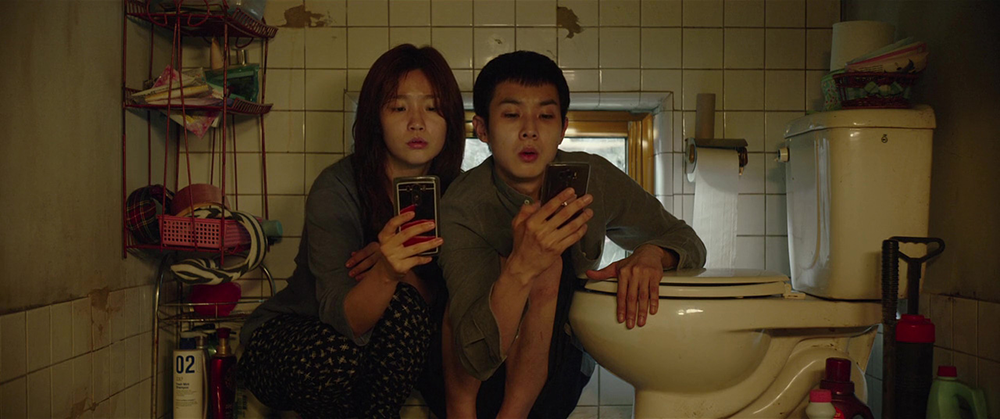★★★★★
With “Parasite,” Korean director Bong Joon-Ho delivers a modern masterpiece that is one of the best films of the year. It is a testament to Bong’s craft that “Parasite” won the prestigious Palme d’Or Award — the highest honor at the Cannes film festival — this year and still maintains its nearly perfect score on Rotten Tomatoes today.
“Parasite” follows the intertwined stories of two South Korean families: the Kims, a poor but crafty family, and the Parks, an incredibly affluent one. At the beginning of the film, viewers are introduced to the former’s daily routine of trying to get by another day, as they scramble to find the closest source of Wi-Fi in their messy and disorganized basement apartment. Between being underemployed and assembling pizza boxes for a delivery company, the Kims have to resort to different lengths to make up for what they lack in wealth.

Their luck changes when their son, Kim Ki-woo (Choi Woo-Shik) is asked by his friend to take over his position as an English tutor for the teenage daughter of the Parks. On the first day of his job, he, along with the viewers, are introduced to the world of the wealthy through the Parks’ spacious house and luxurious lifestyle — a stark contrast to the Kims’ socioeconomic status.
Upon realizing how he has been presented with a once-in-a-lifetime opportunity to elevate his whole family, Ki-woo begins to pull each member of the family into direct employment by the Park family by sabotaging the housekeeper and driver who were there to begin with. The first addition is his younger sister, Kim Ki-jeong (Park So-dam), who becomes the son’s new art tutor assisting in “art therapy.” Their father, Kim Ki-taek (Song Kang-ho), then follows her before taking over as the new chauffeur. Rounding out the ensemble is their mother, Kim Choong-sook (Hyae Jin Chang), who replaces the family’s new housekeeper.
The montage of just how the Kims are able to fully deceive and infiltrate the Parks is truly a work of pure genius, and the comedic value of it all cannot be understated. One aspect that remains consistent throughout the movie is the family’s ability to work as a unit, as they pretend to not only be high-in-demand workers, but also unrelated individuals who only know each other through “connections” and “professional recommendations.”
Yet, one of the most striking aspects of “Parasite” is Bong’s ability to seamlessly create an overwhelming sense of tension within comedic situations. There is a distinct moment that acts as the film’s catalyst, which pushes it from an entertaining and humorous con act to a terrifying and suspenseful life-or-death situation. Though the tonal shift is stark and could have been off-putting if mishandled, Bong masterfully handles the pace of the story and makes it work seamlessly.
The strongest element of “Parasite,” however, is the underlying theme of the class struggle in South Korea, which is applicable across the world. From the razor-sharp dialogue to the contrast in the two family’s homes and lifestyles, each element deliberately serves to further the film’s commentary on social class. The enormous gap between the wealthy and the poor is brought to a head in an incredibly unpredictable way, and the fallout from the conflict is one that stays with the viewers far past the end of the movie.
As the underdogs of the situation and society as a whole, the members of the Kim family are humanized in a way that leaves the audience sympathetic to their struggles. Because of this, despite the seemingly terrible way that the Kims go about their thoroughly planned scam, one cannot help but root for a successful outcome. Though the film embodies a sort of controlled chaos, the family’s relationship and demonstration of realistic and relatable emotions help anchor the story in a meaningful way.
“Parasite” is genre defying and raises the standard of what a black comedy film can be. The complex task of incorporating and balancing comedy, horror and biting social commentary is handled so masterfully that there is something for everyone. Every moment of the film plays a deliberate role in furthering the story, and by the end, the stakes are higher than ever. Along with the whip-sharp script that grounds the chaotic and delightfully bizarre plot, the film’s cinematography is incredibly aesthetically appealing — a fascinating contrast to the darker themes of the film.
Undoubtedly, the hype and critical acclaim surrounding “Parasite” is fully warranted as a truly revolutionary movie. The film’s brilliant mix of social commentary with comedy, dark reality and tension throughout crafts the movie-going experience of the year and something no one should miss.



















